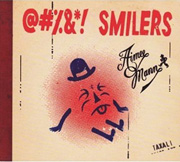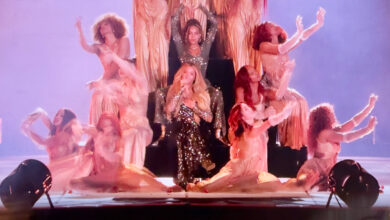(Censored) Brilliant
An interview with Aimee Mann.
By Gregg Shapiro

Aimee Mann is back. Following a live CD/DVD set, a concept album, and a holiday disc, fans of her more straightforward collections of pop tunes such as “Bachelor No. 3” and “Lost In Space” will be thrilled to know that Mann’s latest, @#%&*! Smilers (SuperEgo) is more akin to those recordings. The strikingly packaged assemblage of a baker’s dozen tunes, driven by Mann’s gift for wordplay and for crafting unforgettable melodies, ranks among her best solo efforts, a seamless blend of musical observations on heartbreak and the human condition, balanced by subtle traces of humor.
Gregg Shapiro: What can you tell me about the inspiration for the title of the album @#%&*! Smilers ?
Aimee Mann: It came from this newsgroup. It was a phrase I came across a long time ago. It was sort of a private joke between me and a friend. This newsgroup was ages ago, when we had newsgroups before we had webpages, devoted to people who were bitter. It was called alt.bitter. My friend and I thought that was really funny. Every now and then we’d read, “What are people bitter about?” And one of the threads was titled “F–king Smilers.” It was bitter about people coming up to them and telling them to smile. It’s such a specific thing to be mad about. So we always thought that was funny. And every now and then we’d use that phrase about certain kinds of people, “He’s a f–kin’ smiler.” [Laughs]
I recently interviewed Alison Moyet [of Yaz] and her new disc includes a reference to poet Phillip Larkin. You make reference to poet Anne Sexton in your “Stranger into Starman.” What role does literature play in your daily life and in your work?
I think it’s more of a deep background. I’m not somebody who sits around and reads stuff like Anne Sexton. Obviously, I’ve read her poems because I remembered that, where she talks about how “star” is rats backwards. Which actually at the time I was like, “I wouldn’t be so excited about that if I was you.” [ Laughs ] That’s not really much of a discovery. But there is a fascination with words and letters and almost a feeling that certain things are encoded in a way. Just taking pleasure in words. Reading anyone who has that love of words where you can tell that they take pride in choosing the exact word or the right word or interesting metaphors or anything like that.
That definitely fits in with your work, because what continues to set you apart from other songwriters is that you have this Sondheim-esque turn of phrase. Is that something that comes easily to you or is it something with which you struggle?
I think you just have to care about it. It doesn’t come super easy. It doesn’t come as easy as it does for somebody like Elvis Costello, who clearly is just boiling over with metaphors. But I think if you care about it and spend a little time, eventually something occurs to you that you like better than the other thing. For me it’s just a matter of finding where you draw the line. That’s usually when I’ve been working on something for a while and I kind of have a feeling of “It’s probably not going to get much better than this.”
It’s good to be able to let go of something, too.
Yeah, because I know my limitations. And also it’s not that much fun to just hammer and hammer at something. I think, more or less, if it says what you want it to say, and it says it with a little bit of finesse, then that’s OK. I think most songwriters just don’t try at all. I feel like it’s not that I’m so good, it’s just that other people are so bad. I really don’t think I’m that great. I like to be thought of as being really literary and a fantastic writer, but I think I’m pretty good by my standards. But there are people who are truly great. I think Fiona Apple is a truly great lyric writer, because her metaphors are super interesting and it feels like it comes absolutely from the depths of her subconscious and it’s very meaningful. And it’s filled with insights, genuine sorts of discoveries in songs, where you’re like, “Wow! I’d never thought of that.” That to me is a really great writer.
 @#%&*! Smilers also traffics in what I would describe as musical currency. For example, “Freeway” contains the line, “You’ve got a lot of money/but you can’t afford the freeway.” “Phoenix” has the line, “You love me like a dollar bill.” And “Medicine Wheel” mentions a “five-dollar bet.” Was this deliberate or coincidental?
@#%&*! Smilers also traffics in what I would describe as musical currency. For example, “Freeway” contains the line, “You’ve got a lot of money/but you can’t afford the freeway.” “Phoenix” has the line, “You love me like a dollar bill.” And “Medicine Wheel” mentions a “five-dollar bet.” Was this deliberate or coincidental?
The five-dollar thing, I co-wrote that song with my sister Gretchen [Seichrist]. She wrote the lyrics and I kind of added a couple of words here and there, but most of the lyrics are hers. But I think that it comes from writing about similar people. I have a friend who struggles with drug addiction—you rarely find a drug addict who doesn’t have some other issues—I find that people with drug addiction often have issues with money, putting emotional weight on money where it really doesn’t belong. Like if they have money, they’re OK. Then they can think of themselves as not hitting bottom or not really being that low if they still have money. The role of money in addiction is a really interesting one. Also, living in L.A., people being obsessed with money and status—it can get a little creepy.
The disc The Forgotten Arm was a concept album, and Another Drifter in the Snow was a collection of holiday tunes, and, of course, the songs from Magnolia are forever linked to that movie. Do you prefer having a structure or format, or would rather work in the more traditional approach that a more straightforward album of songs such as @#%&*! Smilers affords you?
Having a structure and having limitations is usually more interesting to work within. I think that I’m usually in the mood for the thing that is opposite the thing I just did. It’s all about contrasts. The last record was a concept album, this time I’m in the mood for each song having its own story. Half of that is just that’s what you’re doing anyway; you don’t have a specific idea about it. For various reasons, I just found myself writing songs that were more fictional or about different kinds of things. There were songs that had originally been started as songs for movies. They had their original germination further outside myself. Then they usually took a crazy left turn and it made the song inappropriate for the movie.
Speaking of movies and form and structure, do you think there might be a stage musical in your future projects?
I’ve talked to someone about the idea of, pretty much in the future, trying to turn The Forgotten Arm into a musical. But that’s the kind of thing that would be years in the making. And I haven’t done any work on that.
@#%&*! Smilers closes with a duet with Sean Hayes on the song “Ballantines,” which isn’t the usual thing one finds on an Aimee Mann CD.
He was a guy that I had seen. I’d heard a song by him called “F–ked Me Right Up,” which is just so super great. I saw him play at Largo and I thought he had a really interesting voice. When I was writing that song, I was thinking that I would like to do it as a duet with someone. The idea of doing it with him occurred to me because I’d seen him play around the time that I was writing the song. I thought it would be appropriate for it because he has such a unique voice. It kind of goes along with that honky-tonk piano.
In the age of iTunes and MP3s and such, you pay meticulous attention to the physical appearance and packaging of your CDs. Do you fear that that is something that could become a lost art?
It kind of already is. But it’s almost like the more lost it gets, the more I want to do it. I’m almost thinking like next time to do an actual little book. I’ve talked to Gary Taxali, the artist who did the artwork for this [ @#%&*! Smilers ] . . . I think we may try to do a little art book together. It’s nice for people to have something to hold in their hands. Like if they really like an artist, to have a memento that’s a solid thing. It’s wearying living exclusively in a virtual world.
It sure is. In the 1980s you lived in Massachusetts, a state where it’s legal for same-sex couples to get married. Now you live in California, another state where gay marriage has been legalized. As one of our straight allies, I hope . . .
[Laughs]
Where do you stand on the subject of same-sex marriage?
It’s funny, because I’ve talked to my husband [musician Michael Penn] about this, and I think I agree with his assessment of it, that marriage is almost a more religious idea. If certain people want to keep that word, then give them that word and have that be the religious part or something. But have the legal benefits be exactly the same and have some other name for it.
If somebody came to you and wanted to use one of your songs at their same-sex union, how would you feel about that?
Any of my songs that are about relationships are usually about the endings of relationships. I wouldn’t want to doom someone [laughs] with one of my songs at their wedding.
Gregg Shapiro is a past recipient of the annual OutMusic award that recognizes contributions by non-musicians in furthering the work of GLBT performers.










